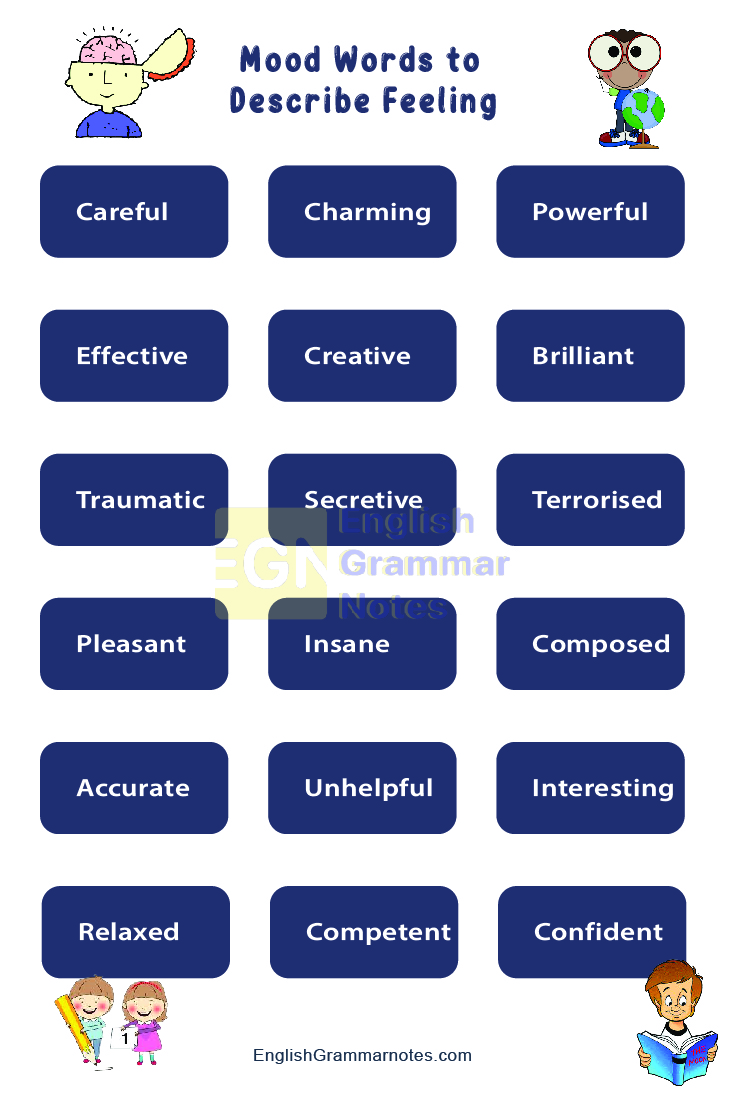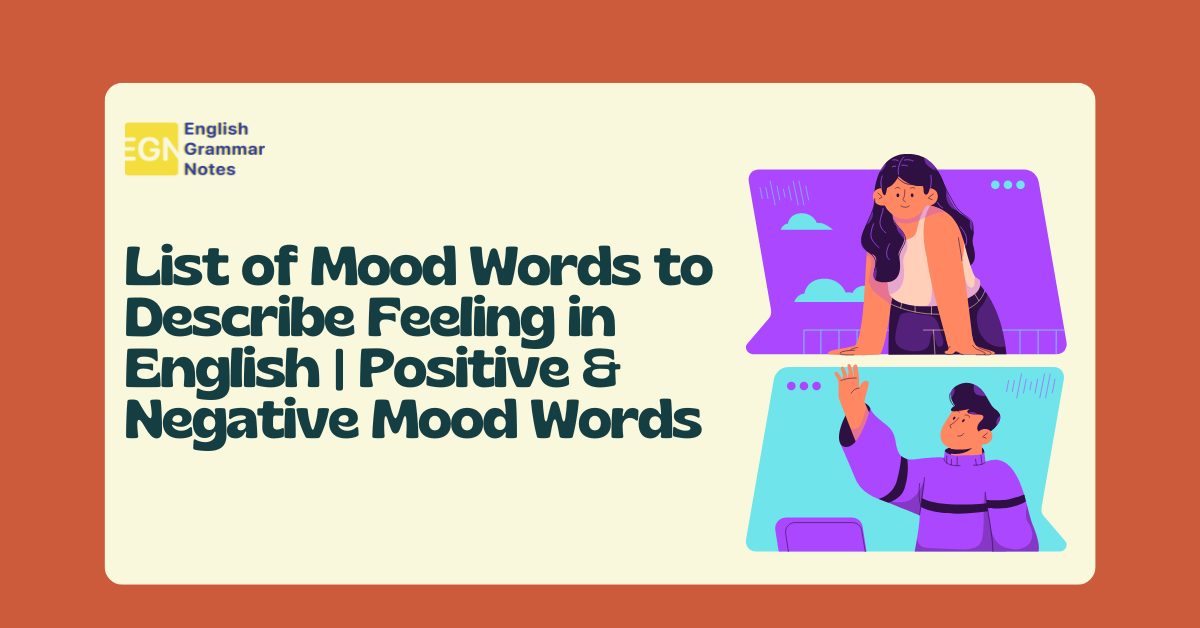Mood words is a word or are a group of words that are used in general communication or a write-up to set a general atmosphere or an emotional complex that involves different kinds of emotions that is to be conveyed to the reader. There are plenty of mood words in the English language that a writer can use to convey his or her feelings to the reader or a viewer and such mood words are used in novels, fiction, non-fiction, movies, videos, write-ups, etc.
In this particular article on mood words, we are going to answer the following questions that are going to help students and teachers to get a clear concept of different tone words in the English Language.
- Mood Words – Definition & Meaning
- List of Mood Words | Positive & Negative Words to Describe Mood
- Mood Words Example Sentences
- Where are Mood Words used?
- What is the importance of mood words in the English Language?
- How to teach mood words to students?
- What are some of the most common human emotions?
- Are mood words adjectives?
Mood Words – Definition & Meaning
In simple words, mood words can be defined as a single word or a group of words that are used in a piece of writing to evoke an emotional response from a reader and to set a general atmosphere with an undertone or overtone of emotion that evokes feelings in a reader or a viewer.
While there is no particular set definition for mood words, the basic understanding is the same, and mood words are not just confined to the English language there exist mood words in different languages and literature. One should note the importance of mood words here because every piece of writing, whether fiction or non-fiction, will have mood words in it and sets a particular tone and texture to the write-up.
List of Mood Words | Positive & Negative Words to Describe Mood
Below we have given 100 lists of mood words that are going to help students, teachers as well as writers frame proper stories and write-ups and effectively communicate emotions to the reader:
- Idle
- Cheerful
- Sorrow
- Happy
- Sad
- Cheerful
- Calm
- Angry
- Energetic
- Lethargic
- Lonely
- Upset
- Hopeful
- Full hearted
- Light-hearted
- Romantic
- Unromantic
- Humorous
- Boring
- Gloomy
- Stressed
- Tired
- Drunk
- Sleepy
- Excited
- Grumpy
- Gullible
- Cranky
- Crazy
- Bouncy
- Cold
- Hot
- Dejected
- Rejected
- Ecstatic
- Euphoric
- Content
- Unhappy
- Unsatisfied
- Satisfied
- Proud
- Ashamed
- Restless
- Lazy
- Fed up
- Crushed
- Cool
- Confident
- Elated
- Bold
- Detoxed
- Grilled
- Cunning
- Clever
- Amusing
- Focused
- Competitive
- Easygoing
- Tough
- Friendly
- Grudge
- Rushed
- Jubilant
- Hopeless
- Uncomfortable
- Loved
- Hateful
- Comfortable
- Shocked
- Optimistic
- Poignant
- Pessimistic
- Nerdy
- Listless
- Infuriating
- Sympathetic
- Placid
- Admiring
- Approving
- Weird
- Indifferent
- Moody
- Hyper
- Hungry
- Full
- Silly
- Thankful
- Encouraging
- Sanguine
- Mindful
- Giddy
- Sick
- Casual
- Effusive
- Envious
- Apathetic
- Dark
- Peaceful
- Geeky
- Grateful

The above-mentioned list of 100 mood words is a comprehensive list and is used in all and most common circumstances. There are thousands of mood words in the English language and most of them can be synonyms and antonyms which is going to help students to have a good grasp of positive mood words to write and communicate well.
Read More:
Mood Words Example Sentences
Below we have given 10 examples of sentence formation using mood words that can be used by students for homework, class work, project works, assignments, and tests. We advise students to find out the mood words in the below sentences and make a list out of the same
- Alan hasn’t had food since morning and that is the reason he is being grumpy for the better part of the day
- Geeta was very angry with her father when he promised to take her out for the weekend but couldn’t due to his hectic work
- It is his confidence and energetic personality that has made Rohit the leader of the class and the favorite student of all the teachers in the school
- I have been thankful to God and my parents for helping me in all my difficult times during the last few years
- One has to be mindful of the words that they use to not hurt someone’s feelings
- I am very grateful to my friend Amit for teaching me mathematics and helping me pass the examination with flying colors
- I was elated to see my marks card where I scored 100 on 100 in the subject of mathematics and chemistry
- Amit was shocked by the fact that he couldn’t pass the mathematics examination despite giving his best effort this year
- It can be called a weird phenomenon when the sun comes out in the middle of the monsoon in the state of Jammu and Kashmir
- Mahendra Singh Dhoni is known as the cool and calm-minded captain of the Indian cricket team
Where are Mood Words used?
Mood words are used in the following scenarios by teachers, students, writers, and the general public:
- Essay Writing: Students can use mood words to enhance the tone and color of their passages in an essay
- Email Writing: A good email should be crisp and well put. Good usage of adjectives and mood words is going to help one frame good email bodies
- Oral Communication: One can use mood words appropriately to convey emotions and feelings
- Debates: Usage of mood words in debates enhances the scoring and gets one more point
- Discussions: General discussions are always lively and fun with the usage of mood words
- Novel Writing: Emotional writing is the most important aspect of novels and fiction and the usage of mood words can help them in the same
- Blog Writing: Now that blogging and vlogging have become a new trend and have their own niche audience, mood word usage can add a lot of tone to the write-up.
Here is the Guide to English Grammar Notes & Study Material for grammar concepts that aid students ranging from beginner to advanced level to score well.
FAQs on Mood Words
1. What is the importance of mood words in the English Language?
Mood words are a very important part of framing proper sentences and communicating in the oral form. Usage of mood words will enhance one’s communication and add an iota of feelings and emotions to set the tone of the situation or a character
2. How to teach mood words to students?
Students can be thought the importance of mood words by making them read and write regularly on a timely basis
3. What are some of the most common human emotions?
Some of the most common human emotions are sadness, happiness, anger, moody, elated, laziness, etc.
Mood words may or may not be adjectives because adjectives define only nouns (i.e., people, places, animals, and things) while mood words can define any circumstances and situations as well.
